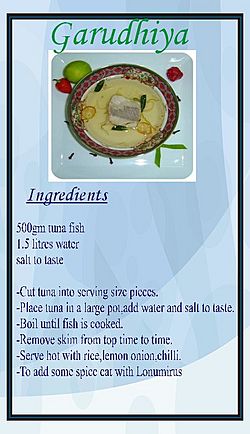Garudiya facts for kids

Garudhiya, garnished and ready to be served
|
|
| Type | Broth |
|---|---|
| Place of origin | Maldives |
| Region or state | South Asia |
| Main ingredients | Tuna |
| Variations | Kekki garudiya |
Garudiya (pronounced Gar-oo-dee-yah) is a clear and simple fish soup. It is a very old and important food in the Maldives, a country made of many islands. This special soup is made from different kinds of tuna fish. These tuna swim in the warm ocean waters around the Maldives. Some common types used are skipjack, yellowfin, little tunny, or frigate tuna.
Even though many new foods have come to the Maldives, Garudiya is still a favorite. People have loved this soup for many, many years. It is a big part of Maldivian meals.
How Garudiya is Made
Making Garudiya is quite simple. First, the tuna fish are cut into pieces. The parts like gills and some insides are removed. Then, the fish pieces, heads, and bones are washed very carefully.
Next, the clean fish parts are boiled in water with some salt. They cook until they are very tender. While the fish boils, a foamy layer appears on top. This foam is carefully taken off and thrown away. This makes sure the broth stays clear and tasty.
What to Eat with Garudiya
Garudiya is usually eaten with steamed rice. It can also be enjoyed with roshi, which is a flatbread similar to chapati. Sometimes, people eat Garudiya with steamed taro or breadfruit. When they do this, they often add grated coconut for extra flavor.
Different Kinds of Garudiya
Most of the time, Garudiya is made simply with just fish, salt, and water. But sometimes, Maldivians add other things to make it taste different. They might use chilies for a bit of spice. They can also add curry leaves and onions to give it more flavor.
There is a special kind called Kekki garudiya. This version has extra spices added to it. While tuna is the most popular fish for Garudiya, other fish can also be used. These include wahoo, mahi-mahi, or bluefin jack.
When tuna-based Garudiya is cooked for a very long time, all the water evaporates. This leaves behind a thick, brown paste called Rihaakuru. This paste is also a very important and popular food in the Maldivian diet.
 | Isaac Myers |
 | D. Hamilton Jackson |
 | A. Philip Randolph |

